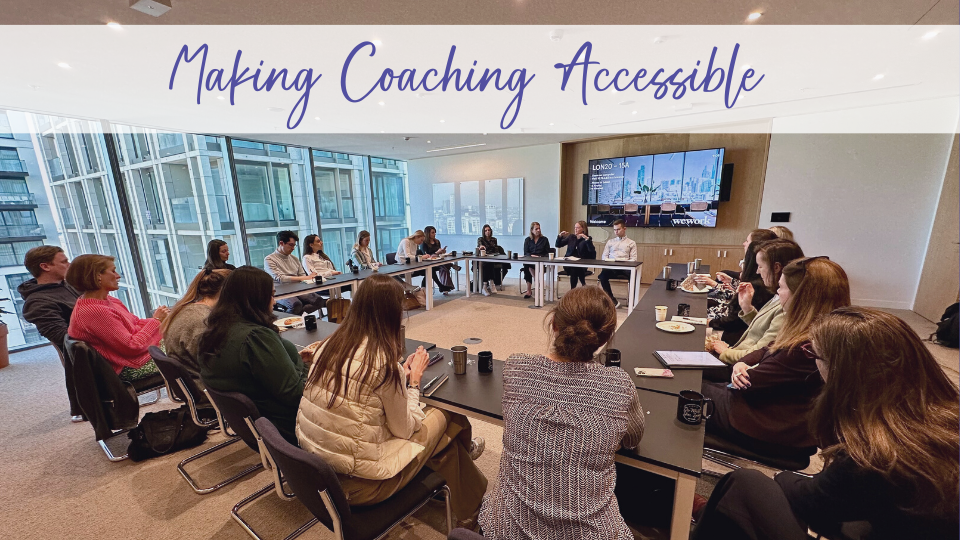On the 20th April, Elliott Scott HR held an in-person breakfast roundtable, exploring how coaching can be made more accessible across the organisation for staff at all levels.
Coaching is often treated in organisations with scepticism as there are business fears of ‘coaching someone out’ or it’s seen as an initiative reserved for senior members of the team.
We invited members of our HR community across industries from Financial Services to Tech to join us and explore this topic; a discussion facilitated by our partners Kate Mansfield from Career Counselling Services and Charlie Girling of W-health.
During the session participants discussed:
What coaching means to them and their organisations:
A mix of experiences, views and businesses at different points in their journeys were shared. In some, coaching was used to clean up messes and in others only available for HIPO and Executives when stepping up into a new role for example or becoming a manager. Whereas one business had taken a different stance with a faculty of coaches available, and another participant shared that all managers entering the organisation are trained and use those skills on their teams and this in turn had fostered a good culture.
The business case to get organisations to invest in coaching:
- In one organisation a mindset shift in coaching was brought on by the Great Resignation which put a focus on retention, employee experience, and giving people the skills to make their employees happy and thrive. As with the first discussion point above, this positive mindset was more notable in those from the Tech organisations that joined us vs Financial Services whose organisations were more likely to view coaching with trepidation. Key to support was the importance of senior buy in and having an evangelist from top-down. Even the more cynical CEO or those in leadership, once exposed to coaching themselves, will then be more interested in what it can do for their employees and their potential. This was backed up by participants experiences in their organisations who had had success with coaching. Unlocking potential was a big discussion point as coaches can work to understand a culture and unlock the potential in your workforce.
- The argument for coaching at all levels – if you bring in coaching earlier in people's careers then you can give them the tools and skills for success in their futures. Making employees more effective will increase ROI and give them the skills to work through problems and improve the business.
- The fear of ‘coaching out’ was raised and tackled with; if you invest in people they will in turn invest in the organisation. Coaching can bring together what is important in an individuals career and what the businesses needs are, the intersection is a collaboration. An employees skills can either stagnate or they can be given the tools to be their best selves and – above all - if someone wants to leave they will do so anyway. Careers now are not linear, they loop and are flexible, employees can return. Psychologist Kim Cameron’s research shows that if you put positive practices in place your businesses return will be 10x your competitors.
- Coaching also benefits employees mental health and wellbeing. It will help them flourish and give them the skills to avoid and counter burnout. It can also help with balancing hybrid working and life/work as it teaches employees how to set boundaries.
- In terms of data for the business, the impact can be shown through; retention data, performance improvement, engagement and lateral career development as markers. Key themes coming out in internal coaching also give a pulse on your organisation – confidentiality remains key but general themes can emerge.
How to make coaching accessible across the organisation:
- Create internal coaches: organisations can provide managers with coaching training and they can then bring this to their teams and all can conduct internal coaching. Or the HR population can be trained to then bring the skills to teams in the organisation. This also benefits HR, especially on the BP side as these employees are on the front line, taking in a lot of the people populations challenges, which impacts their resilience and HR in turn needs support themselves.
- If cost is a barrier options that can be explored include; group coaching, online training or short courses. Businesses can also make an initial investment and trial coaching in one small area of the business and see the benefits speak for themselves and build on this. Get feedback from those involved in any training or coaching and put it to the leadership team to showcase the value. You could also have those in a pilot fill out a ‘flourishing’ questionnaire at the pre and post coaching stages and provide the aggregated data back to the business. Doing coaching training via the apprentice levy is also a different avenue to explore.
Participants shared wider reading and coaching courses some had done with Cambridge and Henley being mentioned.
If you want to try coaching and feel you would benefit from training in or receiving coaching, put your hand up and discuss with your organisation and bring some of the above points to back it up.
We would like to thank everyone that attended for their rich participation in this lively discussion. We are making this event into a series, for the next instalment and future HR events across the globe see our event page here and join our HR Community here.

